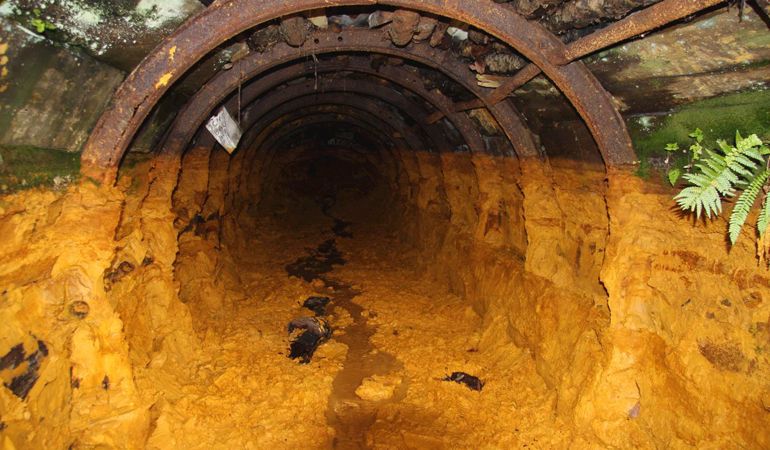Mine water management for future generations tops agenda at international conference

Wales’ industrial past and how it informs its vision for the future will be discussed in the 14th International Mine Water Association (IMWA) Congress, to be held from 12 to 16 July.
The event is a collaborative partnership between Natural Resources Wales, Welsh Government, The Coal Authority and Cardiff University.
This year, for the first time in its history, the congress will be a virtual event but it retains the global profile of previous events with delegates from China, Korea, Kenya, Ghana, South Africa, Europe, Russia, Japan, Australia, New Zealand, Peru, Canada and USA already registered.
IMWA is an interdisciplinary organisation focussed on various aspects of mine water, including hydrology, chemistry, biology, environmental impacts and potential reuse as well as how best to control it through better prediction, management and treatment.
The conference is an opportunity for IMWA members and guests to share ideas on tackling the ongoing effects of former industrial sites.
Event organiser Peter Stanley, NRW’s Senior Specialist Advisor for Abandoned Mines, said:
“Our minerals sector once supplied coal, slate and metals globally. While there remains limited exploitation of reserves, we retain numerous collieries, opencast mines and quarries plus over 1300 abandoned metal mines that alone impact over 700 km of river reaches.
“The Well-being of Future Generations act ensures all public bodies here, must work together to improve our environment and deliver multiple benefits to protect it in the long term.
“For a small country, we like to aim high and punch above our weight and the congress allows us to share our ambitions with the world.”
The event gets underway with a series of short courses to be held on the weekend of July 10-11 before the main congress begins:
Dr Mike Müller of Hydro computing GmbH & Co based in Germany will be providing a 1.5 day short course on Modelling Hydrodynamics and Water Quality of Pit Lakes, featuring Dr Martin Boland from Piteau Associates on a Practical guide to open pit and underground mine water management; Dr Patrick Byrne of Liverpool John Moores University will explain Source apportionment of mine pollution in watersheds: and Dr Denys Villa Gomez from the University of Queensland will explain about Biotechnologies for the treatment of mining and metallurgical wastewater on the context of metal recovery.
The conference will share experience from around the globe, helping countries develop technology, innovation, practice and policy to help a sustainable use and remediation of our natural resources. Whilst elsewhere in the world the extraction of minerals and associated infrastructure like tailings dams has caused terrible impacts on communities and the environment,
Wales the legacy of abandoned mines and metal mind discharges can impacts the nation’s rivers such as those from Parys Mountain. Wales’coal mine tips have also shown that stability and run-off can have significant impacts on surrounding communities during periods of high intensity rainfall
Keynote speakers for the event include:
- Dr Peter Brabham from the Rhondda Fawr and of Cardiff University who will share an overview of metal and coal mining within Wales
- Dr Kym L Morton from Johannesburg who will provide an update on Tailings Dam Monitoring, prompted by recent failures that has led to sweeping changes in industry practice.
- How the Wellbeing of Future Generations Act is used in implementing the Metal Mine Programme and Professor Mike Christie of Aberystwyth University explains a method of attributing value to ecosystem services in a changing climate.
- The Coal Authority will lead a with a keynote from their CEO Lisa Pinney MBE and present on manganese in coal mine waters and how it is managed, in situ hydrogen peroxide dosing and how that can assist passive treatment.
- NRW and the Conference Sponsors WSP [including the recently acquired Golder Associates (UK) Ltd] will highlight the important development of the UK’s and possibly the world’s first scaled dosed sodium carbonate metal mine water treatment system, currently being constructed at Abbey Consols, Pontrhydyfendigaid, Ceredigion., with a keynote speech from Dr Devin Sapsford of Cardiff University and Dr Bill Perkins of Aberystwyth University on passive treatment systems.
- Professor Jose Miguel Nieto from the University of Huelva will present results of column tests applied on mine waters from Parys Mountain that has helped design bespoke passive treatment trials, which is currently being trialled at Cwm Rheidol with assistance from Statkraft and similarly at Parys Mountain aided by Amlwch Industrial Heritage Trust. Dr Tobias Roetting of Golder Associates will present on these trials.
- A feature on the successful Power & Water sono-electrochemistry treatment trials at Cwm Rheidol that has provided an additional treatment tool and which is being used successfully in aqua culture and agriculture.
- Consultancy and niche Welsh- based companies taking part and presenting include SRK on geochemical dispersion in mine wastes of Namibia, Mine Environment Management Ltd (MEM) providing a suite of presentations in association with the geochemical laboratory run by Dr Andrew Barnes of Geochemic Ltd of Pontypool, Maelgwyn Mineral Services and Cambrian Environment Technologies Ltd.
- Professor Christian Wolkersdorfer the IMWA president and Dr Bob Kleinmann the IMWA secretary will start the last day of congress on 15th July with a joint keynote.
To find out more or register for one or more of the sessions, please visit IMWA 2021 Cymru Wales
